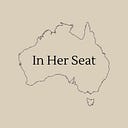Bronnie Taylor: Outside the system
“11 years ago I was determined to make a change and it was my time to put myself at the table and to work from inside.”
Almost 100 years ago, Edith Cowan became the first woman elected to an Australian parliament, in March 1921.
In Her Seat is asking as many currently serving female politicians as we can how they view gender equality, politics and their impact.
This is a non-partisan project that is soliciting contributions from women in all parties, or none at all, in every parliament.
Bronnie Taylor is a Member of the Legislative Council in the Parliament of New South Wales. First elected in 2015.
As she explains below, for a long time she wasn’t politically active. But she saw a need in her community that she felt she could help remedy. Bronnie was catalysed in action over her long career as a palliative and oncology nurse.
Her final nursing appointment before entering Parliament was as Director of Cancer Services for the Southern New South Wales Local Health District. She also served in local government as a deputy mayor.
Since 2019 she has been the Minister for Mental Health, Regional Youth and Women. Previously she served as a Parliamentary Secretary focused on regional issues.
What does gender equality mean to you?
As Minister for Women, it is my commitment to improving the lives of the 4 million women living in NSW.
I am responsible for ensuring the delivery of targeted actions under the NSW Women’s Strategy 2018–2022. This Strategy provides a whole-of-government, whole-of-community policy framework to improve the economic, social and physical wellbeing of women and girls across NSW.
As NSW’s largest employer it is important that the NSW Government leads the way. I am proud to say that the NSW public sector is committed to being a leader on gender equality and a champion for women in leadership and flexible working. We have made good progress to increase the proportion of senior leadership roles held by women — in 2019 representation reached more than 40%.
Which female politicians have inspired or encouraged you?
Fiona Nash the former Nationals Senator is a friend and mentor. She was the first female Deputy Leader of the National Party and was one of the people who inspired me to get into politics.
Fiona is very practical and is solutions focused. That’s a quality I really admire about her and it is something I am always trying to emulate in my work.
‘How is this policy, money or announcement actually going to see changes in our communities?’ I can always turn to Fiona for advice on policy, politics and career.
What inspired you to serve your community?
It was through my work as a cancer nurse that I became politically active.
Before politics, I was a cancer care and palliative care nurse for 20 years. I felt so acutely that my patients were not getting the services they required or receiving the treatment they so desperately needed as close to their homes and their families as possible.
It was because of my patients that I set about lobbying for a local oncology service.
I knew we could safely deliver chemotherapy locally (in the Monaro) and that this would contribute greatly to the treatment options and experiences of our local patients. I lobbied for a local oncology service.
I entered state politics because I want to make sure all patients in regional and rural NSW have the same access to health services as those who live in the city.
What are the most important contributions you are making in Parliament?
In my time as Minister for Mental Health the government has increased its investment into mental health services following the bushfires and the pandemic by $83 million.
The Towards Zero Suicide policy is being rolled out across the state. Ensuring community based access and services for mental health patients right across NSW is one of the most important policies the government is implementing.
As Minister for Regional Youth, I started the first Regional Youth Taskforce. The group is made up of two young people from each region of NSW (aged 12 to 24 years,) who provide advice direct to government on issues that affect regional young people and the future of their communities.
One of the first things I identified when I came into the role as Minister for Women was that women can find themselves vulnerable to financially slavery.
I tasked the Council for Women’s Economic Opportunity to develop a financial literacy resource and the Women’s Financial Toolkit is now established and is up and running.
It is a free online service and available for all women.
What is next for gender equality in politics?
I am honoured to be a woman in politics and to represent the voices of women across NSW.
As a woman living in regional NSW, I would like to see more regional and rural women involved in politics and making a change.
We have a role in encouraging women to enter politics, whether it’s mentoring young women, supporting them in their goals or showing them what is possible with a career in politics.
My history has largely been one working from outside the political system.
For over 20 years I was a registered nurse, specialising in cancer care and palliative care. I was lucky to be one of the first McGrath Foundation Breast Cancer nurses.
For 40 years I was unaligned to any political party, seeking the best in health, education and agriculture for my community.
However, 11 years ago I was determined to make a change and it was my time to put myself at the table and to work from inside.
In Her Seat interviews can be accessed here
